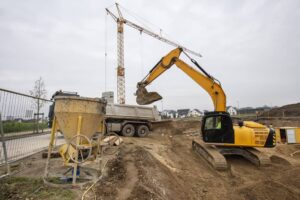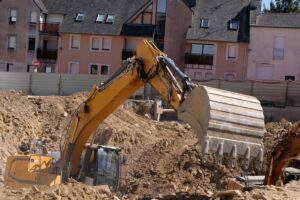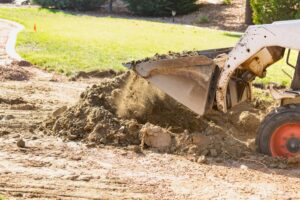
When most people think about the construction industry, they think of heavy equipment or picture building metal structures or frames. Nevertheless, they fail to consider the most fundamental part of the building process: the construction site preparation.
Let's look at the importance of site preparation for residential construction, how it's done, and why ensuring quality work at this stage is of utmost importance.
The site preparation for residential construction begins with the contractor' and engineers' technical knowledge and understanding of this procedure. So, the entire process rests in the capacity of the people in charge.

There should be a fundamental understanding of what a site needs, different types of soil, and obstruction removal that will affect how the project moves forward. Several steps are part of site preparation, including land clearing, demolition, excavation, grading, and installing water, sewer, gas, and underground electric lines.
The subsurface and surface conditions need to be inspected and assessed. This could also involve checking the present installation of underground services. It means checking whether there are or have been certain installations in the past that need to be considered or reworked.
At the same time, engineers must consider any information presented in any land surveying or geotechnical report, calculate the presence of groundwater, and the grading level needed for proper drainage to push water away from the structure.
These steps and components must be carefully considered so that the construction proceeds according to specified plans and requirements.
When site preparation for residential construction is done correctly, all activities are straightforward. If constructing a building needs to be done in a specific place with tons of underground pipes, preparing the site is necessary. By having the site ready, contractors are helped in knowing where to dig and where not to dig.

It will prevent any issues related to underground pipe bursting. Implementing project management for construction is equally crucial because it lessens possible mistakes and delays that can lead to costly reworks.
Below are the five necessary steps to perform proper site preparation for residential construction.
Clearing the site is the very first step in site preparation. The entire site must be in a clear and even condition. The process involves the demolishing of buildings, the removal of trees, and the elimination of any underground infrastructure. These obstacles should be cleared because they might affect the future building process. Completing the project might also be risky if clearing the site is unsuccessful. Hence, it must be prioritized once and for all.
You might need to determine if you are building on the right block if survey pegs do not determine the building block. A surveyor is responsible for surveying the site and lining out the area where the road project or structures will be built.
The process of surveying land might not be an option but is mostly a requirement for zoning and permitting processes. Besides, surveying is the translation of the contractor's set of plans into an actual representation of the project site.
Testing the soil is one of the most critical tasks that have to be done before the site is procured. The soil's main composition should be determined to test the ability to absorb water and examine the ability to withstand structure.
The site engineer must insist on performing all necessary soil testing procedures before commencing any structural tasks.
If the soil at the site needs to be more suitable for future projects, there might be no other choice but to look for another site with soil appropriate for the projects. A chart showcasing the different classes of soil is outlined below:

After doing the soil testing, all necessary septic tanks and drainage should be installed. The next step will be modifying the design to indicate the placement of fixtures and septic tanks. There should also be a permanent record of the underground areas. A construction site is considered a living and breathing thing. Hence, it changes daily as the water tank's placements slightly change. Underground rock formations often cause changes. Using a crew scheduler superior is proven to be a helpful tool during site plan design.
Moreover, the site plan shows all newly developed access roads for temporary storage areas and construction vehicles. The site plan also depicts where the building must be placed after construction. Unlike any other steps taken during site preparation for residential construction, revisions are done in the office, and the site plan is always updated in the field.
Inspection characterizes any proposed sites' rock, soil, and groundwater condition. A geotechnical site investigation is defined as evaluating site conditions and collecting data to construct and design the foundation of a structure. Parking lots, bridges, roads, and buildings are typical samples.
Well-planned strategy and management of a geotechnical site investigation is the primary key to acquiring correct site information. This data is generally used for structure designing with minimum surprises for effort and estimates needed. The preparation of reports and collection of geotechnical data must be considered in the following three stages.
Take a look below:
Several benefits come with quality and professional site preparation. All of these will ultimately have a lasting impact on the final structure or building that is being erected. The benefits include:
Increasing ease of access to the site for all the necessary workers and laborers. Clearing out the site removes these obstructions that might slow down further progress.

One of the biggest benefits of proper construction site preparation is that the right foundation sets the stage. With good site preparation, there is less possibility of damage to the structure or encountering problems once construction starts.
When the site is prepared with utmost caution and precision, it ensures quality and long-lasting stability for the project.
So whether you are looking for full site preparation for residential construction or need a particular service like site clearing, leveling, excavation, or grading services like phasing, staging, compaction, or barrier, we at Shilling Excavation are here to take care of your business. We are experienced professionals with the highest quality training and equipment to ensure your construction site takes off correctly.